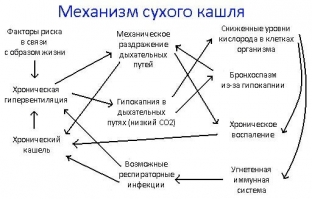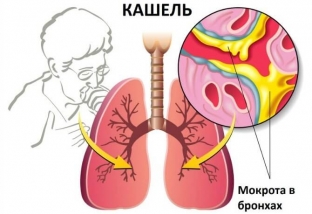Cough accompanies many illnesses and in order to understand the causes of this reflex, one should carefully study other symptoms and visit a doctor for an examination. Cold or flu, heart problems or allergies – in each case there is a cough, wet or dry. And the tactics of treating cough varies depending on its nature. Often, along with a cough, the body temperature rises with a cold, a runny nose begins and the throat hurts. The discharge of sputum may also be accompanied by the body's natural need for self-purification of the bronchi from accumulated mucus. Therefore, it is necessary to distinguish between cough as a symptom of the disease and as a natural self-cleansing reflex of the body. Before you buy cough medicine, you should know exactly what is causing it.
Let's consider in the article:
- common causes of coughing;
- how to get rid of a cough with medications and folk remedies.
The tactics of treating cough depends on its cause (what disease it provoked) and the nature of – productive or non-productive type (with or without sputum production).
Cough: types and causes
Cough – this is an important reflex reaction of the body, which is necessary to cleanse the bronchi of accumulated mucus, foreign bodies and other irritants. The reflex is aimed at restoring the natural respiratory act without interference. This pulmonary symptom has rich causal relationships that make it difficult to diagnose.
There are over 53 causes of coughing. Thanks to the work of the glands of the trachea and bronchi, which (glands) secrete a small amount of mucus, the body clears the airways of accumulated irritants. This secret has a bactericidal effect and with its help the epithelium of the bronchi is cleared of dust and the smallest microorganisms from the air. The process of clearing the airways is called mucociliary clearance.
This process is hampered by the ingress of pathogenic bacteria that trigger inflammatory reactions in the body. High temperature, accumulation of secretions in the sinuses, active reproduction of viruses in the bronchi change the composition of the mucus, it becomes more viscous and acquires a characteristic odor and color. In this case, the mucus turns into phlegm, which prevents the respiratory act. Therefore, the body launches a natural protective reflex – cough in response to the need to constantly clear the bronchi.
Read also: Effective ways to treat a sore throat
Common causes of cough:
- colds and flu, pathologies of the pulmonary system;
- diseases of the cardiovascular system (blood stagnates in the pulmonary circulation);
- impaired functioning of the central nervous system;
- problems in the gastrointestinal tract;
- allergic reactions.
Important indicators of cough diagnostics are: cough productivity / non-productivity, cough reflex enhancement time.
Unproductive cough may be due to:
- excessive viscosity of sputum;
- insufficient breathing depth;
- bronchial obstruction.
For a productive or wet cough it is important to identify the color of the sputum to determine the cause:
- translucent sputum – with bronchial asthma,
- rust-colored sputum – characteristic of heart failure,
- yellow or green (purulent) – with bacterial infections of the respiratory tract.
Morning cough occurs with gastric–esophageal reflux, chronic bronchitis. Night cough is characteristic of bronchial asthma, heart failure, as well as whooping cough or sinusitis.
How to get rid of a cough: treatment of dry and wet cough
Dry cough in most cases develops with asthma, bronchitis or pharyngitis – this type does not produce sputum, and the cough may be barking and choking.
Mechanism to get rid of dry cough: first turn it into wet, that is, a productive type, and only then fight the reflex itself in order to completely get rid of it.

Wet cough (wet) – this is a necessary indicator of a speedy recovery. When the phlegm comes out, the body fights and cleanses itself.
Therefore, the tactic of treating a wet cough is to thin the sputum and make it easier to expel.

So, how do you get rid of a cough? In the case of dry cough, inhalations, the use of infusions and decoctions are of great importance. It is also extremely important to drink more: warm teas, milk, fruit drinks.
With a wet cough, it is necessary to ensure the removal of mucosal edema and make the sputum less viscous. This will help to remove a large accumulation of sputum from the bronchi as quickly as possible, and along with it, pathogenic microorganisms and bacteria.
Read also: 10 folk remedies that will help you quickly cure a cough
There are three groups of cough medicines:
- mucolytic agents – contribute to liquefaction of sputum and facilitate its removal – with dry cough;
- expectorants – intensify cough and successfully remove sputum – with wet cough;
- sedatives – reduce the strength and activity of the cough reflex.
How to get rid of dry cough:
- plentiful warm drink;
- to use drugs – mucolytics (as prescribed by a doctor);
- inhalations (alkaline);
- drink warm milk with butter, honey or soda (at the tip of a knife);
- Take cough suppressants (in case of minimal bronchial sputum).
How to get rid of a wet cough:
- drink plenty of water;
- to use drugs – expectorant group to activate the reflex and quickly remove sputum from the bronchi;
- inhalations;
- must have a chest massage so that stagnant sputum is cleared faster when coughing.
Cough management should be clearly understood and followed. If you misinterpret the symptoms and take remedies with a dry cough that should have been taken with a wet one, this will only aggravate the situation. A persistent cough cannot be ignored, so if the cough reflex lasts more than 3-4 weeks, you should visit a doctor and find out the causes of this symptom.






Add a comment